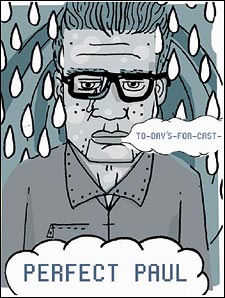WHEN JOE DESROCHERS, dockmaster at Connecticut’s Guilford Town Marina, first heard the voices of Craig and Donna on his weather-band receiver last summer, he was somewhat heartened. NOAA Weather Radio’s new computer-generated voices were a definite improvement over their annoying predecessor, a synthesized robo-voice dubbed Perfect Paul, who had been broadcasting forecasts and warnings for the past five years. But like so many mariners, mountaineers, and other weather-dependent adventurers who spend lots of time alone, he still wished for the day when real people ruled the NOAA airwaves.
 Illustration by Mark Todd
Illustration by Mark Todd
DesRochers well remembers that dark morning in January 1997 when the silence in his shed was broken not by a live meteorologist, but by the bass-heavy, monotonous sound of Perfect Paul. His metallic drone—the same voice produced by physicist Stephen Hawking’s speech synthesizer—was peppered with misplaced inflections and sounded a bit like a Speak & Spell with five-year-old batteries.
“It was terrifying,” says DesRochers, 65. “When I first heard it, I thought foreigners might have captured NOAA’s headquarters.”
NOAA’s high-tech system was able to get updates on the air several minutes faster, but the agency received torrents of complaints about Paul’s creepy muttering. “We even had letters from people who thought Paul was human,” says NOAA meteorologist Joanne Swanson. “They asked us to give the guy a day off.”
Craig and Donna, whose voices carry more natural inflection but are still a little stiff, are getting a warmer reception so far. Ninety-five percent of the 19,000 people recently surveyed on NOAA’s Web site gave Craig a thumbs-up, while 80 percent approved of Donna. Mariners, Swanson reports, overwhelmingly prefer the female voice, while just about everyone else, including hikers, farmers, and athletes, is evenly split between the sexes.
“I think Donna does a great job,” says Evelyn Lees, 45, a Salt Lake City avalanche forecaster. “But I can tell sheÕs a computer. I still miss the real voices.” Other listeners, like New Hampshire outdoor educator Mitch Richardson, 25, are just happy to have company in the woods. ÒTheyÕre not very human,Ó he says, Òbut theyÕre human enough.Ó


